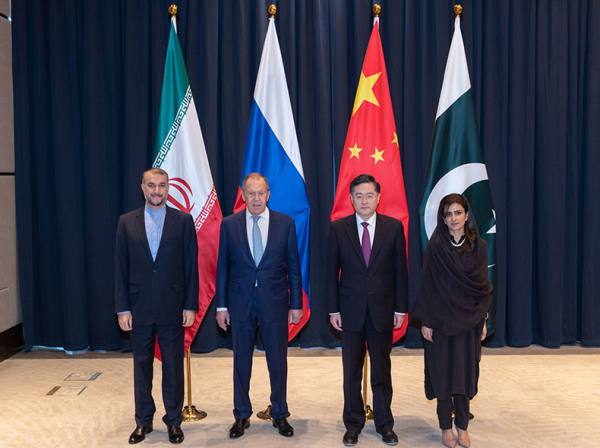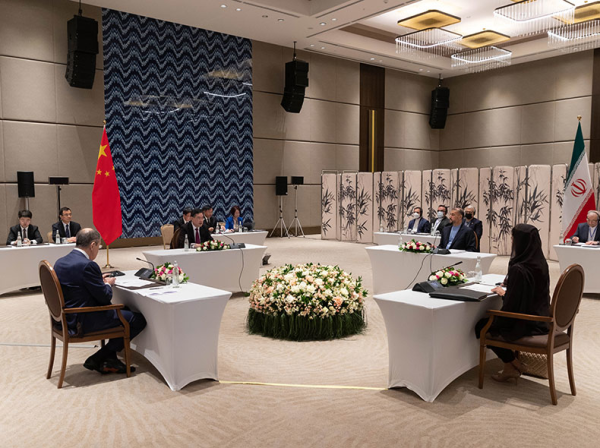
On April 13, 2023 local time, State Councilor and Foreign Minister Qin Gang chaired the second Informal Meeting on Afghanistan between Foreign Ministers of China, Russia, Pakistan and Iran in Samarkand. Russian Foreign Minister Sergey Lavrov, Iranian Foreign Minister Hossein Amir-Abdollahian, and Pakistani Minister of State for Foreign Affairs Hina Rabbani Khar attended the meeting.
Qin Gang said that since the first Informal Meeting on Afghanistan Between Foreign Ministers of the four countries in September 2021, China, Russia, Pakistan and Iran, as core forces in coordinating the Afghan issue in the region, have effectively ensured the smooth transition of the Afghan situation through concerted efforts. At the same time, although the war in Afghanistan has ended, the Afghan issue is far from being solved. Afghanistan is in a critical transition from chaos to order and still faces multiple challenges. A few days ago, China issued the Global Security Initiative Concept Paper and China's Position on the Afghan Issue, calling on countries to adapt to the profoundly changing international landscape in the spirit of solidarity, and address the complex and intertwined security challenges with a win-win mentality, and reaffirming that the Afghan issue and other international and regional hotspot issues should be solved by political means.
To promote the political settlement of the Afghan issue under the new circumstances, Qin Gang stressed the need to abandon the Cold War mentality and bloc confrontation, uphold the principle of indivisible security, take a holistic approach to address both symptoms and root causes, and guide the Afghan Taliban to exercise moderate and prudent governance on the basis of mutual respect, equal-footed consultation and friendly dialogue. China, Russia, Pakistan and Iran should make concerted efforts to call on the international community to pay more attention to Afghanistan's terrorism-related security issues, build consensus and pool strength for fighting terrorism, separatism and extremism, and help Afghanistan effectively address terrorist threats and substantially cut off its ties with all terrorist forces. Qin Gang also stressed the need to encourage and support the Afghan Taliban in pursuing a path to modernization suited to the country's realities, and the need to help Afghanistan enhance its capability for self-driven and sustainable development and integrate into the regional economy. China is ready to, within the framework of the Belt and Road Initiative, promote the extension of the China-Pakistan Economic Corridor and the China-Central Asia-West Asia Economic Corridor to Afghanistan, to help transform Afghanistan from a "land-locked country" to a "land-linked country".
All participating parties expressed deep concern over the current situation in Afghanistan, urged the United States and other Western countries to shoulder their due responsibilities, voiced opposition to acts creating chaos in Afghanistan and shifting blame to others and acts weaponizing humanitarian assistance, and called on the Afghan Taliban to build a broad-based and inclusive governance and safeguard women's rights and interests. All parties said that they will strengthen communication and coordination, leverage the unique strengths of the four countries and the quadrilateral mechanism, and guide the international community's joint efforts to help Afghanistan achieve peace and development at an early date.

